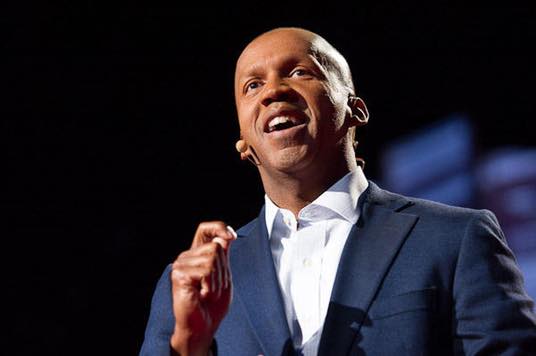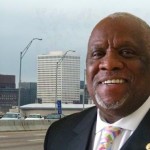
The smashing grand opening this past Friday of the autobiographical film Just Mercy, about the life and work of Bryan Stevenson (the crusading lawyer and founder of the Equal Justice Initiative who has worked tirelessly for decades to reform the criminal justice system and defend those on death row), is heartening. Reportedly, in every theater around the country — even in virtually all-white neighborhoods — audiences are standing and applauding at the film’s conclusion. We can only hope that, once again, as it has in other instances in the past, the profound impact of the medium of motion pictures can change a culture. Maybe now everyone who is fair-minded in their hearts will want to see this film, which will make them then understand with their heads.
With that in mind, I thought it might be helpful for readers to experience Stevenson in his own words. The following are excerpts from a number of recent interviews he has given. The film, as the title suggests, is more than simply a movie. It’s a clarion call to action — it’s a demand that we as a nation address the racial and economic inequities that undergird the criminal justice system and in by doing so, we begin to practice mercy.
“Many people, most people in this country don’t want there to be inequality and injustice. They don’t want people to be treated unfairly or cruelly. I just think if you get closer to it, you’ll be motivated to say more, to do more,” says Stevenson. “I do hope people that see this film will walk away with a greater consciousness about why we need to do better in this country when it comes to creating a justice system that is fair and reliable. Presently in this country, you are treated better if you’re rich and guilty than if you are poor and innocent.”
When asked why he focused on the case of Walter McMcMillan (see my previous review of the film to read more about the case), Stevenson responded, “When I was writing the book, it was just going to be one of maybe 20 or so cases that I talked about at length, but there was so much richness in the Walter McMillan case. I mean, first of all, the crime took place in Monroeville, Alabama, which is where Harper Lee grew up and is the setting of the fictional novel To Kill a Mockingbird, and that community so embraces and romanticizes that story. It was surreal when I began working on this case to have a whole community directing me to go to the To Kill a Mockingbird Bird Museum, talking proudly about their relationship to that story while I was trying to get them to pay attention to the plight of an innocent black man who’d been wrongly accused of killing a young white woman. And I just thought there was a lot to explore in the case. Mr. McMillan was poor. He was a person of color. The people who convicted him, I think, had every reason to know that he was not guilty and yet he was convicted and sentenced to death anyway. They put him on death row before he had actually been tried or convicted of any crime. And there were just so many elements that exposed the way fear and anger have shaped our criminal justice policymaking in this country.”
Speaking about what drives him to do this work he says, “I always tell people that you can’t do this kind of work with just ideas in your mind. To make a difference in this space, you’ve got to have the ideas in your mind fueled by conviction in your heart. And the great gift I have is that I am the great-grandson of people who were enslaved and they believed in freedom when it wasn’t rational to. And I’m the grandchild of people who were terrorized by lynching and they believed in a better future, even though that didn’t seem logical. I’m the child of people humiliated by segregation and Jim Crow, and yet they believed I could be anything I want. And it’s that orientation of hopefulness that has sustained me. We say in the film and I say when I give talks, ‘I believe that hopelessness is the enemy of justice.’ If you want to do justice work, you have to be prepared to believe things you haven’t seen. And it’s what continues to define the work I try to do today.”
Lastly, speaking about America’s criminal justice system, Stevenson said, “I’ve come to believe that each of us is more than the worst thing we’ve ever done. I don’t think that if someone tells a lie, they’re just a liar. I don’t think if you take something, you’re just a thief. I think even if you kill someone, you’re not just a killer. And justice requires that we understand the other things you are.
“I believe in holding people accountable. It’s not that I’m opposed to punishment, but I don’t think we can reduce people to one act, because, I think, ultimately issues like the death penalty can’t be resolved by asking, ‘Do people deserve to die for the crimes they’ve committed?’ I think the threshold question is, ‘Do we deserve to kill?’”
Amen.
